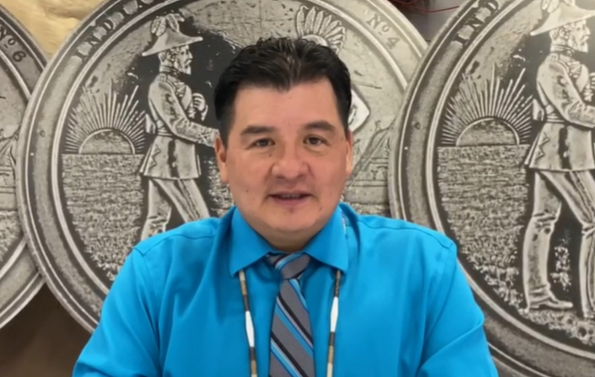SASKATCHEWAN — Chief Bobby Cameron of the Federation of Sovereign Indian Nations (FSIN) said they are all pained and saddened by Pope Francis’ “lack of effort to apologize” for residential school sites.
“We would request that he come to each of our regions, he doesn’t have to come to every single residential school, but he would come to each region and pick one residential school and make that apology,” Cameron said.
“Help our survivors and descendants continue that healing journey, because that’s what that apology means. It’s a part of that healing journey.”
The FSIN represents 74 First Nations in Saskatchewan.
The continued request for an apology came at a joint press conference on June 18 between the FSIN and the Government of Saskatchewan. The province announced it is providing $2 million to the FSIN to conduct research into undocumented deaths and burials at residential schools in Saskatchewan.
FSIN estimates set the cost of the entire search to be about $5 million, which would cover the ground penetration project, holistic healing protocols and ceremonies, as well as survivors input, meetings and dialogues.
Don McMorris, minister responsible for First Nations, Métis and northern affairs said they expect the federal government to pay for the other 60 per cent of the cost, calling it a “federal government responsibility.”
“The federal government has a large portion to play in this, but we felt that we needed to initiate this, because it’s top of the line for so many right now,” McMorris said. “We want to make sure that we’re there as a provincial government, so we put the money forward expecting the federal government will follow suite with that.”
The Truth and Reconciliation Commission documented 20 federally funded residential schools 1880s to 1990s operated in the province. Sites in Timber Bay and Île-à-la-Crosse were provincially funded, and due to it were denied settlement funds that the other sites survivors received.
The FSIN have identified Muskowekwan, Onion Lake St. Anthony's, Beauval, Guy Hill, Lebret, and Sturgeon Landing as sites to focus on, but McMorris said that they anticipate that the list may grow in the weeks ahead.
“Part of this collective grief we feel as a society is that there are so many questions that remain unanswered and so many records and details that have been lost about these children who attended the schools,” McMorris said.
“To this day it remains unclear just how many children may have been laid to rest away from their families and loved ones without cultural ceremonies at residential school sites across the country.”
Cameron said a large portion of the funding will go to survivors input and hearing their stories to find out where to start searching.
“They have lived it, they have breathed it, they have witnessed it, they experienced it. It’s so fresh on their minds, that’s why it’s so crucial and critical they’re fully involved every step of the way,” he said.
“Their input, their guidance is going to drive this whole process. We cannot be more clear or we will not deviant from their direction and advice. It’s going to be a long process, a healing process and we’re going to see this to the end.”



